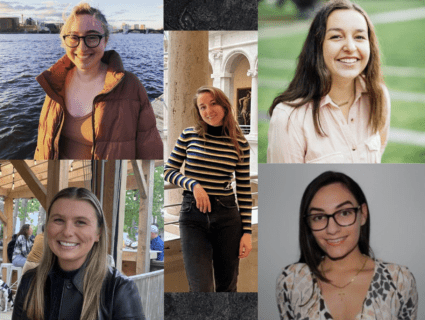Projects: Collaborate.Health
Addressing the Barriers that Adolescent Girls Face in Managing their Menstrual Cycles in Ghana
Reaching 100 schools across the three municipalities and an estimated 10,000 adolescent girls with reproductive health information and resources to manage their menstruation.
- Agency Partner
- Reproductive Advocate Health Education (RAHE)-GHANA
- Course
- Program Design for Global Health
Overview
Reproductive Advocate Health Education (RAHE) – GHANA is an independent, non-profit, organization based in Ghana. RAHE- GHANA is devoted to improving the quality of health services, general well-being of people and communities through a right based and professional approach. Their vision is to create a society in which citizens are empowered to equitably access the whole spectrum of quality social services and national resources. With a large mission covering areas that include Public Health, Education, and Gender and Women Empowerment, RAHE – GHANA actively works with communities to identify challenges and create plans to address them in the best and most cost-effective way. RAHE – GHANA emphasizes providing education for children, improving health outcomes among adults and children, and enhancing the quality of life for women and children living in rural communities, the elderly, and other traditionally marginalized populations.
Context
The Menstrual Hygiene Management Project, to address the barriers that adolescent girls face in managing their menstrual cycles on a greater scale. Currently, the project exists in 55 schools located in Awutu Senya East and Assin North municipalities. To this point, the project has reached an estimated 8,500 girls. However, as a small and relatively new organization, RAHE – GHANA seeks to enhance the current program to reach a greater number of Ghanian girls in the Central region
Challenge
Many school-aged girls in the rural areas of Ghana often experience barriers to accessing quality menstrual products and education. These barriers frequently lead to long-term academic consequences such as high absenteeism and ultimately, increased secondary school dropout rates. Research has shown that the impact of insufficient knowledge of menstrual management practices and products has a root cause in non-existent dialogue in the community regarding female menstruation. The lack of dialogue and misunderstanding has shown to cause severe social stigma and cultural taboos, a shortage of hygiene products to manage menses, and an ingrained sense of bodily shame for many young girls who do not fully understand the process they are undergoing.
Solution
Our Boston University School of Public Health has partnered with Reproductive Advocate Health Education – GHANA to upgrade The Menstrual Hygiene Management Project. The upgraded project will extend to a third municipality, Assin South, in addition to the current two to reach an additional 100 schools across the three municipalities and an estimated 10,000 adolescent girls between the age of 9 and 15 years who menstruate. The proposed project consists of four components at the school and community level to address lack of information, lack of sanitary materials and facilities, and negative gender norms and social stigmas surrounding menstruation. Our proposal application will monitor the level of knowledge gained at weekly educational classes for the girls, the decrease in cultural stigma and increase in support of community members, and will provide reusable menstrual pads to many of the school girls, along with the tools to create future reusable pads.
Results
The Menstrual Hygiene Management Project has been successfully implemented in 25 different schools. The proposed project enhancements are currently in the process of being funded to implement in addition schools. However, we are confident that the proposed intervention will successfully impact the lives of 10,000 young Ghanian girls. The proposed project will be implemented in staggered phases across the three municipalities over a course of three years.
Project Timeline
This project took four months to complete from kick-off meeting to presentation of final deliverables. Click the button below for a detailed timeline.
View Project TimelineThe RAHE-Ghana Program Design Consulting Team

Julia Shuler, Erica De la Garza, Ilyssa Otto, Ashlie Alarcon, Maggie Burkhardt